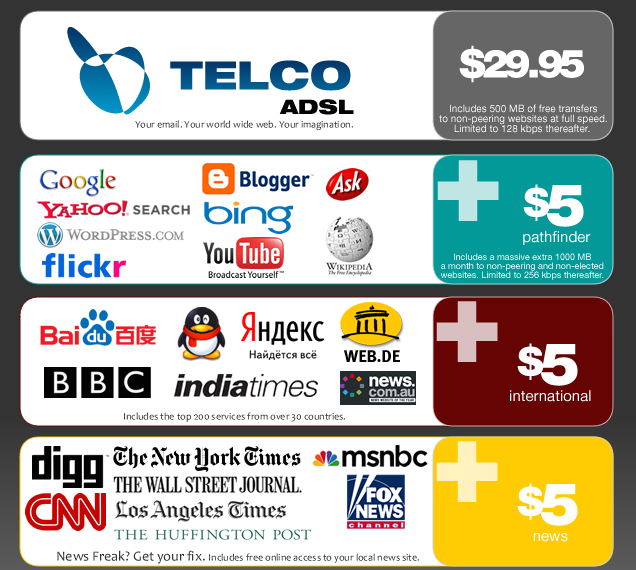Let's imagine something. Let's say that you're a town planner, working for the city where you live.
Your city has an issue with congestion. Large, 18-wheeler trucks drive in, and they get stuck. Lanes get blocked up, and eventually, all motor vehicles are moving at a pace as slow as cold molasses.
Being the smart individual you are, you decide to route all of the large trucks through slower, less convenient routes. However, you decide that should they wish to use the fast paths, they can do so provided that they pay up.
What if we applied this analogy to the Internet? Let's imagine that instead of being a town planner, you are running an ISP. You notice that Netflix and YouTube account for a huge percentage of the traffic coursing through your network. So, you decide to slow down these massive bandwidth hogs, unless they fork out for the increased costs of transmitting their data.
This, in a nutshell, is the antithesis of what Net Neutrality is. The idea that all traffic should be treated the same, regardless of the content, origin or destination. A significant number of people see Net Neutrality as something essential to the long-term survival of the Internet as a free, unencumbered tool for empowerment and the free exchange of information.
Prioritizing traffic is a direct threat to that. In this article, we're going to look at why Net Neutrality matters, and why we should fight to protect it.
Who Would Be Against Net Neutrality?
A common criticism of those who advocate for Net Neutrality is that they're asking for something that simply isn't reasonable, fair or attainable. Let's be clear. Asking for Net Neutrality isn't asking for free-of-charge access to the Internet. Nor is it asking for higher, better quality of access for less money. In actuality, it is asking that all Internet traffic be treated equally. This would likely manifest itself in the form of legislation which would prevent telecommunications companies from splitting the Internet into a fast lane, and a slow lane.
It sounds innocuous. So, why would people be against it?
Of course, there are some legitimate arguments against Net Neutrality. There are some genuine concerns about letting the government legislate the Internet. Some worry about a potential slippery slope, where governments become empowered to enact laws which effect more and more of the Internet, thus destroying the laissez-faire spirit of the Internet. As a result, there is a rash of Libertarian think tanks and pressure groups, such as the Cato Interest and the Ayn Rand Institute who have came out against Net Neutrality, with the latter describing it as the "Destroyer Of Internet Freedom" and having produced videos on the subject.
This is relatively understandable. When governments legislate the Internet, they get it horribly wrong. Just look to South Korea, where the government mandated that banking and e-commerce websites authenticate users with an ActiveX plugin, which is a horribly antiquated (and insecure) genus of browser plugins available exclusively with Internet Explorer. .
This effectively ensured that all South Koreans are forced to use Internet Explorer. To this day, OS X and Linux hasn't seen the same degree of adoption in Korea as it has in Europe, China and the United States. It also means that 75% of South Korean netizens use some variety of IE because… Well? They have to.
It also means that many South Korean websites are fundamentally less advanced, less user friendly and much less secure than their Western counterparts. The cruel irony is that this government intervention effectively hamstrung an entire industry.
Of Net Neutrality And Vested Interests
It should go without saying that some of the ISPs who are most vocal against Net Neutrality are the ones with vested interests in cable television. There are some concerns that aren't really in the interest of the consumer.
Millions have already cancelled expensive cable TV packages in favor of Netflix, Amazon Prime Video and BitTorrent, which are significantly cheaper and more convenient than their traditional counterparts. It should go without saying that these newer services depend on their users having access to fast, affordable broadband.
As a result, these ISPs are eager to protect their vested interests in the broadcast television. They don't like the fact that their monopoly on television and movies has been challenged. They're scared.
As a result, it's hardly a surprise that the likes of Comcast -- who offer cable TV packages - aren't keen on the idea of Net Neutrality. And it was hardly shocking when Netflix announced in February that they had "partnered" with Comcast to deliver their content to American consumers.
It goes without saying that money changed hands here.
There was a genuine business case for Netflix paying Comcast for better streaming speeds. Although, many fear they irreparably damaged the case for Net Neutrality, by showing that content providers can be persuaded to pay for better access. Indeed, USA Today announced the news of the deal by describing it as the "final nail in Net Neutrality’s coffin".
A Nightmarish Future Vision Of The Internet
Let’s take the fears of the Electronic Frontier Foundation and the Open Rights Group to their logical extreme. Let’s imagine if the Internet stopped being an equal-access conduit for packets and bytes, but a medium where consumers have to ‘buy in’ to access certain services. It's not as unrealistic as you might think.
Those of us old enough to remember the first Internet equipped cell phones might also remember paying extra to access certain services, such as news websites, celebrity gossip and email. Thankfully, the Internet doesn't really work like that. People tend to pay monthly (or per-gigabyte) fees, and in return gain access to the Internet in its entirety.
But what if the Internet was like the WAP phones of the late 90s? Whilst we've moved on from then, it's still not out of the realm of possibility. One Redditor imagined just that. In a mock advertisement that has since been spread across the Huffington Post, Buzzfeed and Gizmodo, Redditor Quink imagines a world where one has to pay extra to access online video, news and social websites. Not unlike how one pays extra to get a sports package, or HBO with Comcast or Time Warner.
Chilling, isn't it? Whilst this isn't a realistic threat to the Internet, it shows what could potentially happen if the Internet ceased to be an unrestricted medium.
How We Can Protect The Internet
There are people who don't like a free, impartial Internet. They will seek to fundamentally reshape its architecture in order to best serve their interests. They are winning, but the battle isn't yet over.
Already, in Europe, Israel and Chile, legislation has been introduced which makes Net Neutrality a reality. But there's still much to be done. If you're concerned about Net Neutrality, perhaps you might want to join the Open Rights Group or the Electronic Frontier Foundation, who fight for the preservation and protection of the Internet.
Finally, if your ISP starts shaping traffic, consider voting with your feet and your wallet, and moving to an ISP which respects the integrity of the Internet. In the UK, one such ISP is called Andrew and Arnold, and whilst their services are a tad expensive, they have a stated commitment to Internet freedom and net neutrality. Likewise, if you're fortunate to live in a part of the US with Google Fiber, consider moving to them.
You might also want to read an earlier debate MakeUseOf had about the future of Net Neutrality.
I'd love to hear your thoughts on this subject. As always, if you've got something to say, leave it in a comment below.
Image Credit: batintherain (Flickr)



